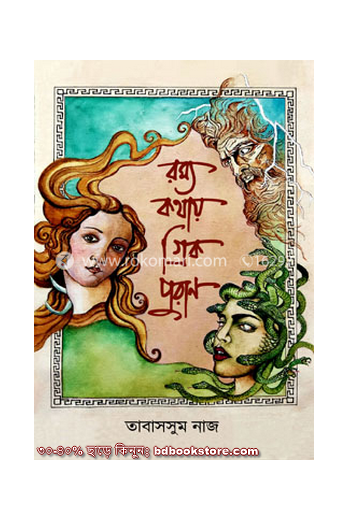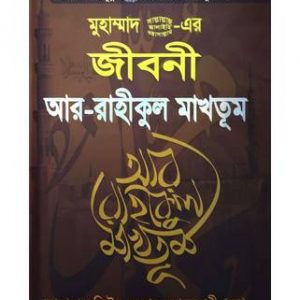| Title | রম্য কথায় গ্রিক পুরাণ |
| Author | তাবাসসুম নাজ |
| Publisher | পেন্সিল পাবলিকেশনস |
| ISBN | 9789849539957 |
| Edition | 1st Published, 2021 |
| Number of Pages | 164 |
| Country | বাংলাদেশ |
| Language | বাংলা |
রম্য কথায় গ্রিক পুরাণ – তাবাসসুম নাজ
৳ 375.00 ৳ 300.00
rommo-kothay-greek-puran-tabassum-naz review:
Myth or Purana- This word seems to have an insurmountable attraction. From the youngest to the oldest, one can see a strong interest in the Puranas in one way or another. This interest can be seen again in the case of Greek mythology. Why so much interest in Greek mythology? One of the main reasons for this is that many of our words come from Greek mythology. The same can be said of Indian mythology. This is what we say, the origin of Akalkushmand or Agastya Yatra is from Indian mythology. Similarly the most common ‘Achilles heel’ or ‘Pygmalion effect’ or ‘Electra syndrome’ – these come from Greek mythology. As much as we know Indra, we know Zeus in the same way. When one hears the name of Asclepius as one of the medical sciences – naturally comes from Greek mythology.
If the main source of this Greek myth is mentioned, the name of the great poet Homer comes first – the creator of the Iliad and the Odyssey. Hesiod was very famous among Homer’s later writers. Both are Greek; But there was a difference in one place – especially in the style of writing. Homer was a devout man, and in his writings we see the triumph of the gods. Hesiod, on the other hand, was almost contemporary with Homer, but he sought to find an explanation in Greek mythology. He wanted to know how everything happened, how the earth, the sky, the gods, mankind came into being, he wanted to find an explanation. He was the one who said, “The gods did not create the universe, the universe created the gods.”
Notable among the Roman writers who came after the Greek mythologists were the great poets Virgil and Ovid. In his book Metamorphosis, Ovid compiles a vast collection of Greek mythology. In terms of enormity, Ovid’s writing cannot be compared to anyone else’s. In another case the comparison does not go away. That is, he was the first Purana writer to narrate the Purana as a ‘story’. He had these stories – sometimes juicy and hilarious, and sometimes extremely rhetorical. The only difference he had with the Greek writers was that the Greek writers saw it as a fact, described it with deep respect, and Ovid saw it as a story.
Writing in this way has the impression of a Munsiana, the most courageous. Making fun of the gods or making fun of them – not a joke!
But we do not find this remarkable thing in one of the Greek myths written in Bengali. Most importantly, with one or two exceptions, there is not a single good book on Greek mythology in Bengali. As can be seen, in most cases it is a translation of an original English text. Translations have not always been easy to read. The most translated Greek mythology in Bengali is probably the Greek mythology of Edith Hamilton. Besides, there are only a few texts on the stories, and only a couple of texts cover the entire Greek mythology. In this context I can speak of my own work, Greek Mythology – from the beginning to the end – where attempts have been made to bring almost the whole of Greek mythology. Yet those who have read the book almost unanimously say – it is basically a reference book! In fact, what I want to say is that no book of Greek mythology in Bengali has been found so far!
Wrong! A book has recently been published – about Greek mythology – which is written in the language of Ramya! This extremely brave and extraordinary work was done by Tabassum Naz in his book ‘Ramya Kothaye Greek Purana’!
Tabassum Naz is a doctor by profession, living abroad. He continued to write tuk-tuk as well as medicine in his expatriate life, although it developed quite abruptly. After finding a literary group based on Facebook, he started writing there regularly and wrote a fiction book on Greek mythology, Rhea in the Kingdom of Hades. That is to say, his first book was the entry of the story in Greek mythology! From such a person ‘Greek mythology in delightful words’ can be expected.
Cover:
Let’s start with the cover first. The cover of the book is said. Sadituzzaman. The author’s understanding with the cover artist is excellent. Sadit also covered some of Tabassum Naz’s other books, which made it very easy for the cover artist to understand how the author wanted the cover. This matter is very important. The cover of a book gives me an idea of the book, just as the name of the book gives a clear idea.
Sadit depicts three Greek characters on the cover – Zeus in the top right corner, Aphrodite in the middle left, and Medusa in the bottom right. Interestingly, the breadth of these three characters in Greek mythology. The god Zeus – who is the ruler of all things – is above all, and we see signs of lightning. Aphrodite, the goddess of love, sometimes looking bored with her messy hair, and finally looking at the goddess of love with vengeance – Medusa, one of the most tragic characters in Greek mythology! Sadit not only showed his skill in portraying the character, his color combination has also been remarkable! The ambush on the cover jacket has made the cover more lively, as well as the typography of the title. However, those who know about Sadit’s work may think that Sadit has not yet fully recovered from the effects of T-bag work. Besides, there is nothing to say on the cover except fascination!
Inside the book:
If you look at the table of contents, you will understand that this is about Tabassum Naz Olympians





Reviews
There are no reviews yet.